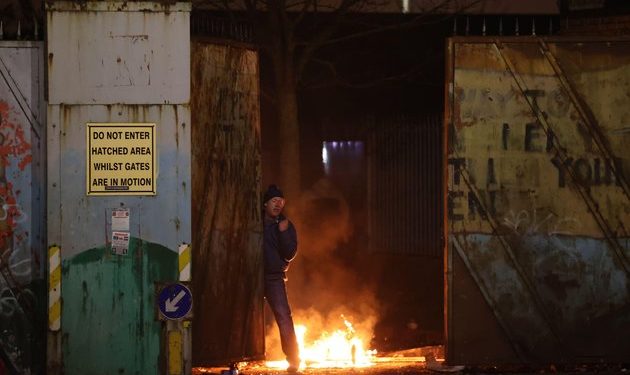The Conversation
Since March 29, violent protests have been flaring up across Northern Ireland. They began in loyalist areas, with young people attacking members of the police. The fragile peace was threatened further when, on April 7, the riots turned into sectarian clashes at one of Belfast’s interfaces, or so-called “peace walls”, separating the loyalist Shankill Road and nationalist Springfield Road.
The reasons for the current riots are complex. Loyalist discontent with the consequences of Brexit, long-term deprivation and disillusionment with governments both in Belfast and London, and low confidence in the police have all played a part.
Observers have also been quick to point to the influence of paramilitaries with criminal motives. The accusation is that they are egging on young people and encouraging them to lash out at police. The police have appealed to “those in our community with influence” to condemn the violence, and politicians have more directly called on the loyalist paramilitary groups to do the same. It’s not clear if the riots were orchestrated or erupted spontaneously, but they have been concentrated in areas controlled by loyalist paramilitary groups.
For those not following Northern Ireland politics, the fact that paramilitary groups still play a role at all may come as a surprise. In ongoing research, we are investigating where, how and why these groups continue to carry influence.
Understanding this is key to lasting peace in Northern Ireland. While there is little doubt that several paramilitary groups are engaged in criminal activities, in some communities, paramilitary groups operate as people “with influence” because they have a certain social standing.
Local ‘justice’
When conflict broke out in 1968, urban communities erected barricades to protect themselves from ethnic rioting and attacks from both state and non-state forces. They became known as “no-go” areas, where the state and formal policing were absent. Local defence groups and, shortly thereafter, paramilitary groups, quickly came to take on the community policing role.
Now, years after the conflict ended, the informal “justice” role taken on by the paramilitary groups continues in places. This is because armed actors can benefit from the social control such a role grants them but also because civilians are socialised into relying on them.
Drawing on systematic evidence, we find that areas where informal “justice” systems operated during the conflict are predictors for where similar systems operate in the post-conflict period. These areas include many of those that have seen rioting lately.
The informal “justice” systems that emerged during the 30 years of the Troubles have continued in the more than 20 years following the Good Friday Agreement. Both loyalist and republican paramilitary groups still carry out so-called “punishment attacks” as a means to police “their” communities. Those accused of crimes in the community – such as drug dealing or anti-social behaviour – are targeted by paramilitary groups in what the police refer to as “paramilitary-style attacks”.
The beatings and shootings are brutal and disproportionate. Police have described groups of assailants armed with iron bars or baseball bats and have reported targets being shot in the knees, elbows, feet, ankles or thighs. Police statistics show that these attacks have been a consistent feature in certain areas ever since the Troubles.
Relying on a nationally representative survey conducted in 2016, we find that in areas controlled by loyalist groups, some people find informal authorities to be effective in dealing with day-to-day activities that officially are the realm of the police. This includes addressing anti-social behaviour. Our findings speak directly to the Independent Reporting Commission’s 2018 report, which concluded that there was fear and anger about the coercive control exercised by paramilitaries, but also that the paramilitaries were “regarded by some in the community as protecting their areas”.
The very fact that there is a public campaign highlighting the brutality of punishment attacks – with slogans such as “Paramilitaries don’t protect you. They control you.” – suggest that these practices exist also because people turn to the paramilitaries.
While community and youth organisations have been central in calming tensions in Northern Ireland in the last few days, it is noteworthy that the latest rioting subsided after loyalist groups called for a “period of mourning” following the death of the Duke of Edinburgh. Even though the Loyalist Communities Council, an umbrella group representing the main loyalist paramilitary groups, claims that its members have not been involved in the riots, this demonstrates the influence loyalist figures wield.
Like many armed groups, paramilitaries in Northern Ireland have long relied on criminal proceeds to fund their operations. Yet paramilitary groups are considered by some as sources of authority – at the expense of the state’s authority. Over a long conflict, they came to be seen as protecting their communities from both external and internal threats, even though they are involved in criminal activities.
As the dust settles on these recent flare-ups, we should question why paramilitaries retain such influence instead of denying that they do.
Authors: Kristin M Bakke – Professor in Political Science and International Relations, UCL | Kit Rickard – PhD Candidate, Department of Political Science, UCL






